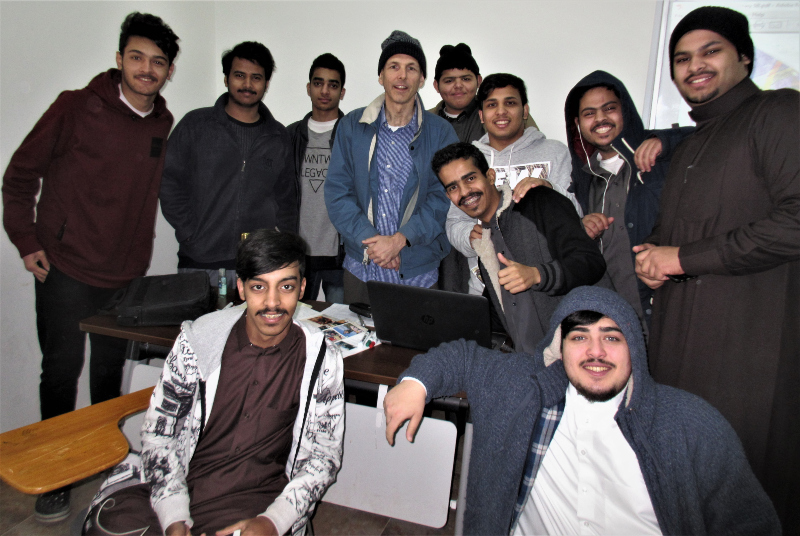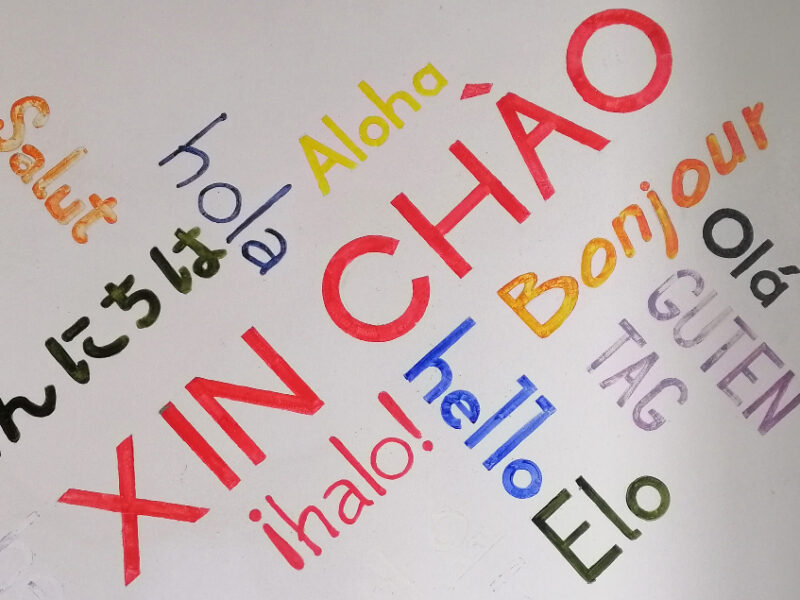On foot in Panama City, I ordered a fruit shake from a drive through window. I was charged for, and got four huge shakes in styrofoam cups.
I thought my Spanish was functional.
I was on a tight budget, yet had no choice but to write the mistake off since I couldn’t say what I needed to fast enough. Maybe my confidence was lacking.
I should have said something like:
No ordré cuatros jugos, ordré solo uno.
I knew the words but couldn’t get them out. The transaction happened so fast. The place was busy. The girl was in a hurry. There was a car right behind me that wanted to pull up.
After heading back to the hostel, I tried to drink a shake.
They all had nasty milk in them. This made me wonder:
Who came up with the bizarre idea of mixing cow’s milk with fruit? And here they do it by default. How criminal.
The mix caused nausea. My microbiome doesn’t like fruit mixed with milk. So, I wasted close to $10 for a dairy-induced stomach ache. Consequently, I had an epiphany:
Speaking a foreign language is beneficial to both health and wealth.
I needed to find ways to make language learning easy.
The Only Time is Here and Now
I sometimes meet travelers who think about how wonderful it would be to speak a local language. I’ve heard:
I should have done better in high school Spanish.
OR
I’ll learn it before I come back.
First of all, it’s best to do the bulk of language learning in a country that speaks that language. On top of that, the past and future don’t really exist. All we have is today.
The idea is to take the first step right now. Then, if you keep adding those stress-free language building moments, you’ll eventually see how learning new vocabulary becomes easy.
If you studied a language in high school or college, that’s great! Or maybe you were fortunate to have a natural stint with another tongue as a kid. Even if you think you’ve forgotten it, you’re almost sure to feel Déjà vu when diving back in.
Having studied or used the language in the past is a bonus. But if you never studied a language or didn’t study the right language, that’s perfectly OK. You can start from scratch here and now by learning something basic, like hello. Then for fun, learn goodbye and see you later. Build on each piece of vocabulary and feel it get easier as the fun of learning is enhanced.
If you wish to pursue the language of a country you’re traveling to or living in, you probably already know a few words or more. Keep adding more.
Build Vocabulary by Chunking
Once you have the numbers one to 10 embedded in your brain, they’ll overlap and chunk up to a million or more. The initial memorization work is 1 through 10. 11 through a million or more, goes much easier once one to 10 are mostly intact. And these first 10 numbers often have one syllable, which helps in the ease of memorization.
After studying numbers and greetings, move on to days of the week. Don’t just learn one random day, learn all seven together. Try to group your language learning this way.
The next day you could study a few common verbs. Next, food-related words, and so on. But keep to one language area if you can, like the days, months, or telling time. This method provides more overlapping and an easier, faster way to remember words.
For example, there are seven days in a week. That’s seven new words. As an easy bonus, all those words end in day. So day is an extra, easy overlapping piece of vocabulary picked up. It automatically sticks from learning the seven days. There are seven days in a week. The number seven is reviewed and the easy one-syllable time word, week is chunked in.

End-of-semester photo, Dec. ’16, University of Hafr al-Batin, Saudi Arabia.
A fresh-from-scratch English learner could learn sun and day while learning Sunday. Days of the week are capitalized in English since they’re proper nouns (names). English capitalization could be touched upon simulteously while reading, writing, listening to, and saying days of the week.
Acknowledging capitalization while learning days of the week is especially excellent for ESL learners whose mother tongue doesn’t have capital letters; for example, with Arabic, Japanese, or Thai speaking natives. It’s also helpful to remind Spanish speakers that capitalizing days of the week isn’t optional like in Spanish.
When multiple language items and skills are naturally learned simulteanously, I call it language stacking.
Take it Easy – Make it a Game
In my opinion, stress shouldn’t be associated with language. Relax. Try to go step-by-step. Accept perceived setbacks. I like to tell stressed-out ESL students:
Relax. It’s only English. We’re not studying to be air traffic controllers, so make all the non lethal mistakes you want. Mistakes are improvements anyway.
With all due respect to air-traffic controllers, air travelers ought to worship them instead of take them for granted. If I make a mistake learning or teaching language, no harm is done. If an air-traffic controller makes an error, he or she might be putting lives at risk.
Language acquisition can’t be a race. It’s something that happens over a long period, with no end. There’s no sense in comparing yourself to others. Make the language go easier by focusing on your constant improvement, even if feels slow going.
As much as I prefer to not regurgitate quotations, my mind can’t help but refer back to:
A journey of a thousand miles starts with the first step.
Lao Tzu, ancient Chinese philosopher
I extend this time-standing quote:
The first step is really easy. Pick a word. Read it. Write it. Listen to it. Say it.
Voila. You have a new word in your language arsenal.
Language Overlapping: Comparative Advantages
Thai and Lao Share Similarities
The very first step can be as simple as: Hello. That’s Sabai Dee in pasa Lao and Sawa Dee in pasa Thai. We added a second word without thinking about it. Pasa means language in Lao. It’s the same in Thai. Pasa Thai is a lot like Pasa Lao. And if you speak bahasa Malay or bahasa Indonesia then you know that bahasa means language in Malay and Indonesian. So if you know the word language in one of these four languages, you know it in the others.
This is an example of a comparative advantage that shows how some vocabulary acquisition is easy across languages.
Scandinavian Languages
From full-toddler exposure and beyond, I can automatically throw out sentences in Norwegian, even with a native sound. There are so many dialects in Scandinavia that I could get away with saying I speak Danish, or Swedish. Although I struggle to understand different vernaular, I can manage in those three languages since they’re so similar.
Although Finnish is a completely different language, many people in Finland grow up studying Swedish as a third language. The Swedish produced by these Finns is easy to understand since they don’t speak ultra-fast like a native speaking Swede, Dane or Norwegian may.

I once spent a weekend in Iceland. Because Icelandic is what Norwegian was 1,000 years ago, I could understand and read some words. I stress some as Norwegian has changed considerably since those long-gone viking days.
If you know Norwegian and/or English numbers, German numbers are easy to pick up in Austria, Switzerland, Germany and a small part of northern Italy. The exponential effect goes on. The more you learn, the more you build, as the fun increases.
The Two Main Iberian Languages
I went nuts studying Spanish. I read a beginner’s textbook and did the exercises. I attended a full-immersion program in Guatemala and read through a whole English to Spanish phrasebook. I watched movies from Spain, Mexico and Colombia.
I was fortunate to have the opportunity to pick the brains of Venezuelans and other Latinos I’d befriended in graduate school.
Broke and on American credit, I traveled to Spain on a super-shoestring budget. After heading home and working for six months, I was off on a backpacking adventure through parts of Venezuela, Colombia and Ecuador. This is how badly I wanted to keep learning Spanish.
Being passionate about the language you want to learn will speed up the process and enjoyment. I believe some zeal is necessary to have fun with the language.
Without affection for the foreign tongue, learning can feel dry and hopeless. If you don’t love a language you need to learn, pretend you do. Fool yourself. Create the positive passion. It’ll aid the process considerably.
Spanish immersion is easy since gregarious locals are thrilled when an outsider puts in an effort. Cumulatively, over a long time, on and off, I acquired a working knowledge of español, a humongeously useful language.
Since Spanish and Portuguese are the two main languages of the Iberian Peninsula, they share similarities.
After three stellar stints feeding my young-adult brain with language in the Spanish speaking world, my Portuguese coworker told me of a Brazilian travel agent amigo who had a special on a RT to Rio.
Two weeks vacation and a 15-day excursion to Rio de Janeiro was secured. The nine-hour flight from Newark, after the short flight from Boston, cost $400 round-trip. Thanks to the travel agent’s price hack, I’d scored a deal for the ages.
My Portuguese friend was thrilled I was heading down to his sister land. The other colleagues didn’t know what to make of this traveling-far-away-to-another-place idea. It was as if drifting off to a place for no particular reason wasn’t something anyone did.
Never mind, think about the local language and trying to acquire some of it, just for fun nevertheless.
Once you stop thinking about what others think of you, is when you’re completely free.
I’m repeating or paraphrasing someone’s words again. I don’t remember who. But let me add:
So drift if you feel the urge. The vast earth is calling your name.
It was late 1999. I had Internet on a Pentium. I found what I could on the Portuguese language online and picked up a Brazilian Portuguese phrasebook at the now defunct Borders Bookstore at Downtown Crossing. This is the same place I’d hang out with Matteo Salvo discussing language and memory a decade later.
I borrowed Pimsleur cassettes from the BPL – Boston Public Library.
For a consistent half hour every night for four weeks, I listened to and read Portuguese simultaneously. I couldn’t believe how easy it was to remember the words and sentence structure. It wasn’t Spanish. But because of the Spanish I’d already spent a ton of time with, there was no brain fatigue. I was thrilled to be studying Portuguese with such ease.
Upon arrival in Rio, I communicated in a gringo-sounding, Latin blend called Portañol, a mix of Spanish and Portuguese. This is absolutely no joke as it can function much better than English.
My Portuguese was limited. But by mixing in Spanish words, I was able to have conversations. Thanks to my attempts at the local tonuge, people were friendly and open.
Thanks to the Spanish I’d consistently taken in over a couple of years, my brain had easier access to communicative Portuguese. I remember thinking:
Bonus Language – YES!
Pineapple is Ananas in a Whole Bunch of Languages
After learning that pineapple is piña in Spanish, I learned that it’s ananas in Portuguese. Ananas instantly remained in my memory since it’s the same word in Norwegian.
Being super fortunate to do an ESL teaching stint in Japan in ‘04, I quickly noticed that pineapple is ananas in Japanese, too.
When buying groceries next door to where I lived in Okayama City, I had an agreement with the cashier. When she put the food item through, she would say the word in Japanese and I would say it in English. That’s how I remember learning ananas and thinking just how ridiculously easy it was.
This is an example of language bartering and how efficient it can be. She was working, I was buying my groceries, and we stacked in language learning with review every time.
When you touch or see a language item physically, you remember it faster. Like when I learned ga-ray-pu-fa-rut-u in Japanese. Grapefruit. Japanese has a lot of easy western words like this borrowed in.
A French person once asked me while trying to scan his brain for the word pineapple in English:
How do you say ananas?
I didn’t know that ananas was pineapple in French but I understood him perfectly, while this taught me that it’s ananas in French, too.
Ananas is not pineapple in every language but it is in many, including Arabic.
8% of Arabic Words are the Same or Close to the Same in Spanish
When going to the Middle East to work for the fist time, I tried to learn some Arabic basics. Thanks to having acquired a reasonable knowledge of Spanish, some new Arabic words were instantly learned.
While in a store, a coworker pointed at some olives and asked the clerk what they were. He said:
Azeitun.
My brain instantly referred to its Spanish reference. Azeituna is olive in Spanish. Olive in Arabic was instantly cemented in my memory bank.

Major sand storm , 2017, Hafr al-Batin, Saudi Arabia.
While staying in an employer-provided apartment/hotel in Hafr al-Batin, I thought about buying a second pillow since one wasn’t enough. I went down and asked the Sudanese manager.
Would you by chance have an extra pillow? I prefer two.
The man in charge immediately spoke to the Nepali resident cleaner, handy man, polyglot and makeshift jack of all trades. In the fast Arabic he spoke to the Nepali, I picked out the word mohada.
My brain referenced the Spanish word for pillow, Almojada. Other than the al’ it was exactly the same.
While sweet-tooth browsing in a ubiquitous Saudi bakery, I saw the word torta by the cakes for sale. Immediately my brain triggered the Spanish word for cake, torta. It’s exactly the same in Arabic. This sort of thing excites me.
Over time I’d continue to receive bonus Arabic words thanks to the Spanish I’d studied and immersed myself in. Here are a few more food words that are similar in Arabic and Spanish.
NOTE: Egglpant is tough in Arabic and Spanish. Not all words can be remembered with great ease. But you see the similarity.
| English | Arabic | Spanish |
| rice | aruzz | arroz |
| oil | zayt | aceite |
| eggplant (aubergine) | bazinjan | berenjena |
| watermelon | sindiyya | sandía |
While teaching ESL surrounded by Saudi desert, I did a fair bit of hitchhiking. About 80% of the time I had to communicate in Arabic. This helped my Arabic immensely and was great fun.
About half the time I had to haggle the cost of the makeshift cab fare. Knowing numbers saved a fair amount of money over time, as did the free rides I got 50% of the time.
Many people in the middle east are genuinely generous and will refuse to charge you for a ride. Unless the person is obviously dirt-poor, trying to hand the money over is an insult. You can’t.
Because it’s a sign of respect, locals will be happy you’re trying to speak their local tongue.
French is a Beneficial Language
Recently at the sauna in Laos’ capital, a local man realized my Lao was limited, so he said:
“Parles-tu français.”
“Non, un peu.”
Like a few Laotians I’ve come across, he’d spent years living and working in France.
I’ve never studied French and have spent little time in Quebec or France. But in our conversation I was able to throw some French in with the Lao and English. This comes mainly from Spanish, but also English.
Grammatically, French is similar to Spanish. And thanks to my Mom’s west coast Norwegian dialect, the ‘r’ sound in French is exactly the same as that Bergensk Norsk (Norwegian dialect spoken in Bergen).
I firmly believe that if I visited or spent substantial time in a French speaking land, that I could learn it fast. With English, Spanish and Norwegian, a fourth European language should retain quickly with proper immersion.
A French expat who lives in Laos told me:
French and Spanish are the same.
While I disagree, I understand what he meant. The structure is Latin, a native speaker in one Latin language has the capacity to thrive in another Latin language. This Frenchman has spoken both since childhood.
The bottom line is that once you take that first step, you can only improve. There’s no other possibility. And thanks to language overlapping and stacking, with desire, consistency and passion, language learning is easier than most of us realize.
Do you have any experience building languages from childhood or as an adult? Do you agree that it gets easier as you go along? Leave a message below or feel free to connect on Facebook or Twitter.
If you’re interested in starting to learn Spanish, check out Survival Spanish in 7 Days.



Moi bueno, amigo!
Obrigado TONY! It just hit me. Obrigado is thank you in Portuguese; while it’s Arigato in Japanese. The two lands/languages are far away. I doubt there’s any correlation, but Brazil and Japan are great friends. Many Brazilans live in Japan and vice versa.